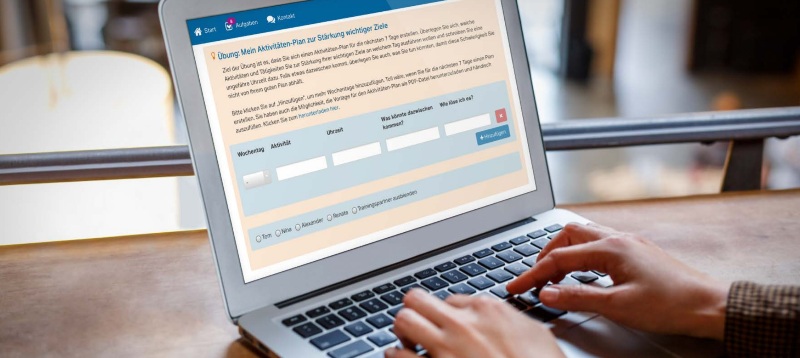A transdiagnostic intervention to prevent depression and anxiety: that's what ICare Prevent is. The intervention is not just tested for efficiacy, but also on cost-effectiveness. Dr. David Ebert, lead researcher of ICare Prevent, explains all about the project, his motivation and the future of ehealth.
Dr. Ebert, for this study part of the European research consortium ICare (an EU Horizon2020 project), is a renowned researcher in the field of evidence-based online interventions for mental health care. He particularly focuses on prevention and early-intervention in mental health conditions. Together with his team, he has developed 15 different internet-based interventions, the efficacy and cost-effectiveness of which has been evaluated in more than 40 randomized-controlled clinical trials (RCTs).

In addition to his research activities, Ebert is interested in the implementation of evidence-based interventions for the prevention and treatment of mental disorders in standard care. Working from this perspective, he founded the GET.ON institute, an EU-backed project that intends to implement online interventions in healthcare, in cooperation with several universities. Within the Schön-Kliniken, a large private clinic chain in Germany, Ebert was responsible for the implementation of computerised psychotherapy in routine care. In addition, he is acting president of the International Society for Research of Internet Interventions (ISRII).
The ICare Prevent research is a study of whether it’s possible to reduce anxiety and depression with the help of online interventions. For this purpose, a multinational study was launched in four countries – Germany, Switzerland, Spain and the Netherlands. “We can’t say exactly if there are differences in the outcomes between those countries. But the data we have is promising. The programme has been received well and participants reported great satisfaction,” says Ebert.
Self-help training against sadness and anxiety
ICare Prevent is aimed at people who have found that they ruminate more than others, and worry more about the smallest everyday situations, but are not yet depressed. (Depression and anxiety are addressed in separate studies.)
The researched intervention is set-up as a 7-week online self-help training. The aim is to address and tackle impending feelings of sadness and anxiety. The training offers tools to help deal with such feelings and provides back ground information on how the feelings can arise.
The intervention is tested for efficacy and cost-efficiency
In first instance, the goal of ICare Prevent is to develop an intervention that prevents people with mild depressive or anxiety complaints to develop a more serious mental disorder. And secondly, the study tests the intervention on efficacy and cost-efficiency, in both guided and unguided format.
Transdiagnostic
The development of the project is based on transdiagnostic online interventions, which were co-developed by David Ebert. The idea behind transdiagnostic interventions is that symptoms of several complaints overlap, for example in anxiety and low self-esteem. The question in ICare Prevent was if people with developing anxiety or depressive complaints could be helped with one and the same intervention.
The programme consists of several modules, that can be tailored to the needs of the participants of the research. The core contents of the training include:
-
Exercises to incorporate activities into everyday life, helping participants to focus on their values and other important needs in life, and to improve their mood, reduce worries and tensions and regain strength.
-
Learning effective strategies for systematically solving problems that people themselves have influence on.
-
Methods that help to reduce tensions and anxiety, to learn how to gradually cope with difficult situations feelings, how to manage your fears and to generally feel more free.
Even before the project has officially ended, Dr. Ebert's team have seen positive preliminary results. “Of course we can’t say anything about a definitive outcome, but the research was promising. We saw a reduction of the symptoms and an increase in the quality of life of the people who followed the intervention.”
The future of online prevention
Ebert has no doubts: “Over the next five years, online prevention tools will become a self-evident part of healthcare, just as online banking is a matter of course today. Ehealth can be part of both prevention as well as treatment. But there must be a willingness to use it. Only if people can see themselves follow such an intervention, can it actually work.” For Ebert, it’s particularly important that online interventions meet a quality standard, so patients are only offered high-quality and effective interventions. “I think we need a quality mark or another kind of proof for it.”
In addition, Ebert believes in a combination of care methods as the ultimate solution: "For some people, online interventions will have excellent results, while others will find optimal help in one-to-one conversations or in group treatment."
Want to know more?
Along with ICare Prevent, there are other ICare projects worth exploring. Read the interview we had with Barbara Nacke for example, about everyBody, a research on ehealth and eating disorders. Or find out more about CORE, a programme that aims to reduce stress complaints in students by promoting resilience.
The Minddistrict platform is used in many research projects. Find more information about this on our research pages.
If you have any questions or want to know more, feel free to contact us!
